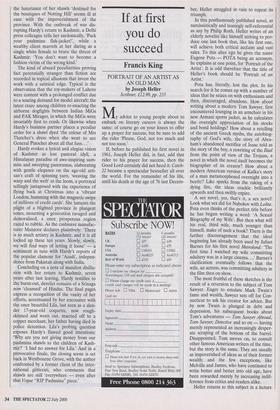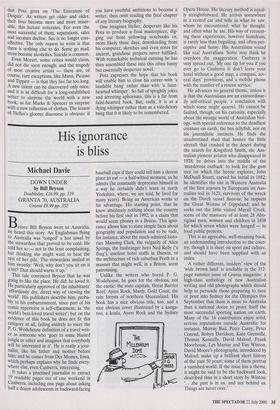If at first you do succeed
Francis King
PORTRAIT OF AN ARTIST AS AN OLD MAN by Joseph Heller Scribner, £12.99, pp. 233 My advice to young people about to embark on literary careers is always the same: of course go on your knees to offer up a prayer for success, but be sure to add the rider 'Please, God, not too much and not too soon.'
If, before he published his first novel in 1961, Joseph Heller did, in fact, add that rider to his prayer for success, then the Good Lord certainly did not heed it. Catch- 22 became a spectacular bestseller all over the world. For the remainder of his life, until his death at the age of 76 last Decem- ber, Heller struggled in vain to repeat its triumph.
In this posthumously published novel, as narcissistically and teasingly self-referential as any by Philip Roth, Heller writes of an elderly novelist like himself striving to pro- duce one last book that, like his first one, will achieve both critical acclaim and vast sales. To this alter ego he gives the name Eugene Pota — POTA being an acronym, he explains at one point, for 'Portrait of the Artist'. It is odd therefore that the title of Heller's book should be 'Portrait of an Artist.'
Pota has, literally, lost the plot. In his search for it he comes up with a number of ideas that he seizes on with enthusiasm and then, discouraged, abandons. How about writing about a modern Tom Sawyer, first encountered lounging in an armchair in his new Armani sports jacket, as he calculates the overnight appreciation of his stocks and bond holdings? How about a retelling of the ancient Greek myths, the autobiog- raphy of God's wife, the story of Abra- ham's abandoned sacrifice of Isaac told as the story of the boy, a rewriting of the Iliad from the point of view of the Trojans, a novel in which the novel itself becomes the biographer of its creator? How about a modern American version of Kafka's story of a man metamorphosed overnight into a beetle? Like sparks from the raking of a dying fire, the ideas crackle brilliantly upwards and then swiftly expire.
A sex novel, yes, that's it, a sex novel! Look what sex did for Nabokov with Lolita. Pota even thinks of the perfect title before he has begun writing a word: 'A Sexual Biography of my Wife'. But then what will his real, third wife, much younger than himself, make of such a book? There is the further discouragement that the ideal beginning has already been used by Julian Barnes for his first novel Metroland: `The first time I watched my wife committing adultery was in a large cinema. . .' Barnes's clarification eventually follows that the wife, an actress, was committing adultery in the film then on show.
The most fruitful of these sketches is the result of a reversion to the subject of Tom Sawyer. Eager to emulate Mark Twain's fame and wealth, Sawyer sets off for Con- necticut to ask his creator for advice. But by now Twain is plunged in debt and depression, his subsequent books about Tom's adventures — Tom Sawyer Abroad, Tom Sawyer, Detective and so on — having merely represented an increasingly desper- ate scraping of the bottom of the barrel. Disappointed, Tom moves on, to consult other famous American writers of the time; but the story is the same. They are usually as impoverished of ideas as of their former wealth; and the few exceptions, like Melville and James, who have continued to write better and better into old age, have been rewarded merely by increasing indif- ference from critics and readers alike.
Heller returns to this subject in a lecture that Pota gives on 'The Literature of Despair'. As writers get older and older, their lives become more and more miser- able, this lecture reiterates. For even the most successful of them, reputations, sales and incomes decline, Sex is no longer cost- effective. The only reason to write is that there is nothing else to do. Some go mad, more become alcoholics. Suicide is common.
Even Mozart, some critics would claim, did not die soon enough; and the tragedy of most creative artists — there are, of course, rare exceptions, like Mann, Picasso and Tippett — is that they live far too long. A new talent can be discovered only once; and it is as difficult for a long-established writer to surprise the world with a new book, as for Marks & Spencer to surprise with a new collection of clothes. The lesson of Heller's gloomy discourse is obvious: if you have youthful ambitions to become a writer, then omit reading the final chapter of any literary biography. One imagines Heller, desperate like his Pota to produce a final masterpiece, dig- ging out from yellowing notebooks or, more likely these days, downloading from his computer, sketches and even notes for ancient, grandiose projects never fulfilled. With remarkable technical cunning he has then assembled these into this often funny but essentially desperate novel. Pota expresses the hope that his book will enable him to close his career with 'a laudable bang' rather than with 'a faint- hearted whimper'. So full of sprightly jokes and arresting aphorisms, this is a far from faint-hearted book. But, sadly, it is as a dying whimper rather than as a valedictory bang that it is likely to be remembered.



























































 Previous page
Previous page